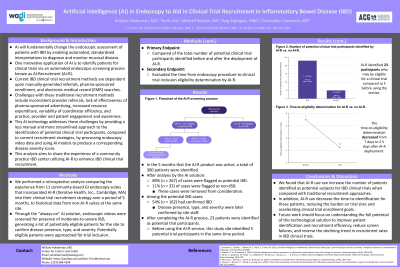Tuesday Poster Session
Category: General Endoscopy
P3409 - Artificial Intelligence (AI) in Endoscopy to Aid in Clinical Trial Recruitment in Inflammatory Bowel Disease (IBD)
Tuesday, October 24, 2023
10:30 AM - 4:00 PM PT
Location: Exhibit Hall

Has Audio

William Holderman, MD
Washington Gastroenterology
Tacoma, WA
Presenting Author(s)
William Holderman, MD1, Parth Jain, 2, Mitchell Reddan, MS3, Haig Soghigian, MBA3, Chris Fourment, MD3
1Washington Gastroenterology, Tacoma, WA; 2Charles Wright Academy, Lakewood, WA; 3Iterative Health Inc., Cambridge, MA
Introduction: Artificial Intelligence (AI) will fundamentally change the endoscopic assessment of patients with inflammatory bowel disease (IBD) by enabling automated, standardized interpretations to diagnose and monitor disease. An innovative application of AI is to identify patients for clinical trials via an automated endoscopic screening process known as AI-Recruitment (AI-R). This technology provides a less manual approach than current methods used to expand the identification of potential trial participants beyond those seen by study investigators. This study aims to share the experience of an IBD center utilizing AI-R to enhance IBD clinical trial recruitment.
Methods: We performed a retrospective analysis comparing the experience from 11 endoscopy suites at a community-based site that incorporated Iterative Health, Inc.’s AI-R product over a period of 5 months to historical data from non-AI-R suites at the same site. Through the “always-on” AI solution, endoscopic videos were screened for presence of moderate-to-severe IBD, generating a list of potentially eligible patients for the site to confirm disease presence, type, and severity. Potentially eligible patients were approached for trial inclusion. The primary endpoint was the number of potential trial participants surfaced with AI-R compared to before AI-R was used. The secondary endpoint was time from endoscopy procedure to eligibility determination for clinical trials.
Results: In the 5 months that the AI-R product was active, 300 patients were surfaced and subsequently 89% were flagged as potential IBD cases. Among them, 54% had confirmed IBD, and their disease type and severity were then identified. AI-R identified 23 potential trial participants compared to 5 before using the service. Time-to-eligibility determination decreased from 7 days to 2.5 days with AI-R. Overall, AI-R increased patient identification and reduced time-to-surface for clinical trials.
Discussion: We found that AI-R can increase the number of patients identified as potentially eligible, and ultimately enrolled, in IBD trials. In addition, it significantly decreased the time-to-surface for these patients, reducing the time burden on trial sites and allowing a quicker turnaround for trial sponsors. Further studies will be needed to understand the full potential of this technological solution beyond improved patient identification to improve recruitment efficiency, reduce screen failures, and reverse the declining trend in recruitment rates in IBD clinical trials.
Disclosures:
William Holderman, MD1, Parth Jain, 2, Mitchell Reddan, MS3, Haig Soghigian, MBA3, Chris Fourment, MD3. P3409 - Artificial Intelligence (AI) in Endoscopy to Aid in Clinical Trial Recruitment in Inflammatory Bowel Disease (IBD), ACG 2023 Annual Scientific Meeting Abstracts. Vancouver, BC, Canada: American College of Gastroenterology.
1Washington Gastroenterology, Tacoma, WA; 2Charles Wright Academy, Lakewood, WA; 3Iterative Health Inc., Cambridge, MA
Introduction: Artificial Intelligence (AI) will fundamentally change the endoscopic assessment of patients with inflammatory bowel disease (IBD) by enabling automated, standardized interpretations to diagnose and monitor disease. An innovative application of AI is to identify patients for clinical trials via an automated endoscopic screening process known as AI-Recruitment (AI-R). This technology provides a less manual approach than current methods used to expand the identification of potential trial participants beyond those seen by study investigators. This study aims to share the experience of an IBD center utilizing AI-R to enhance IBD clinical trial recruitment.
Methods: We performed a retrospective analysis comparing the experience from 11 endoscopy suites at a community-based site that incorporated Iterative Health, Inc.’s AI-R product over a period of 5 months to historical data from non-AI-R suites at the same site. Through the “always-on” AI solution, endoscopic videos were screened for presence of moderate-to-severe IBD, generating a list of potentially eligible patients for the site to confirm disease presence, type, and severity. Potentially eligible patients were approached for trial inclusion. The primary endpoint was the number of potential trial participants surfaced with AI-R compared to before AI-R was used. The secondary endpoint was time from endoscopy procedure to eligibility determination for clinical trials.
Results: In the 5 months that the AI-R product was active, 300 patients were surfaced and subsequently 89% were flagged as potential IBD cases. Among them, 54% had confirmed IBD, and their disease type and severity were then identified. AI-R identified 23 potential trial participants compared to 5 before using the service. Time-to-eligibility determination decreased from 7 days to 2.5 days with AI-R. Overall, AI-R increased patient identification and reduced time-to-surface for clinical trials.
Discussion: We found that AI-R can increase the number of patients identified as potentially eligible, and ultimately enrolled, in IBD trials. In addition, it significantly decreased the time-to-surface for these patients, reducing the time burden on trial sites and allowing a quicker turnaround for trial sponsors. Further studies will be needed to understand the full potential of this technological solution beyond improved patient identification to improve recruitment efficiency, reduce screen failures, and reverse the declining trend in recruitment rates in IBD clinical trials.
Disclosures:
William Holderman indicated no relevant financial relationships.
Parth Jain indicated no relevant financial relationships.
Mitchell Reddan: Iterative Health – Employee, Stock Options.
Haig Soghigian: Iterative Health – Employee, Stock Options.
Chris Fourment: Iterative Health – Employee, Stock Options.
William Holderman, MD1, Parth Jain, 2, Mitchell Reddan, MS3, Haig Soghigian, MBA3, Chris Fourment, MD3. P3409 - Artificial Intelligence (AI) in Endoscopy to Aid in Clinical Trial Recruitment in Inflammatory Bowel Disease (IBD), ACG 2023 Annual Scientific Meeting Abstracts. Vancouver, BC, Canada: American College of Gastroenterology.
